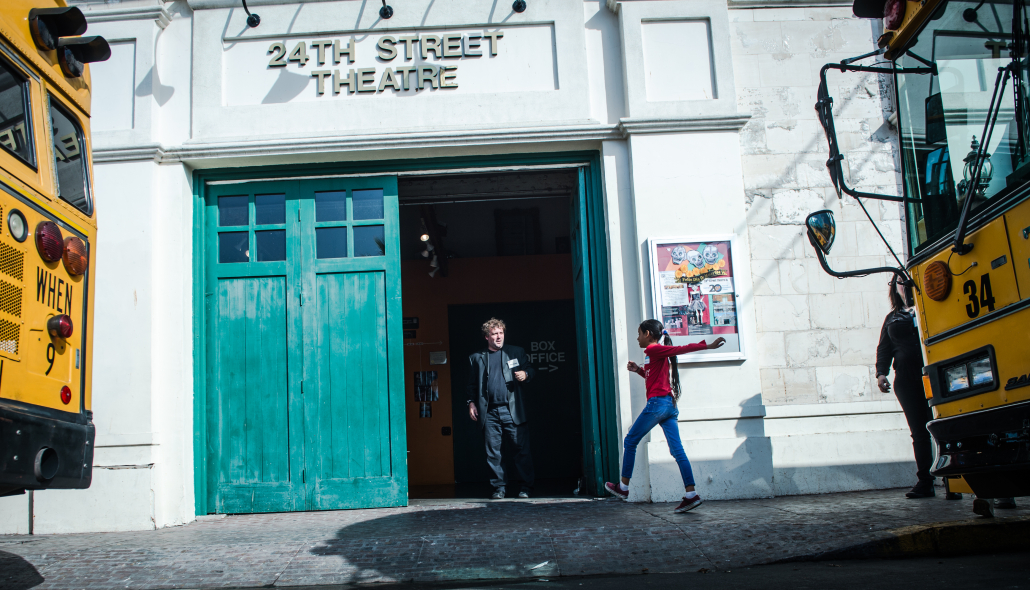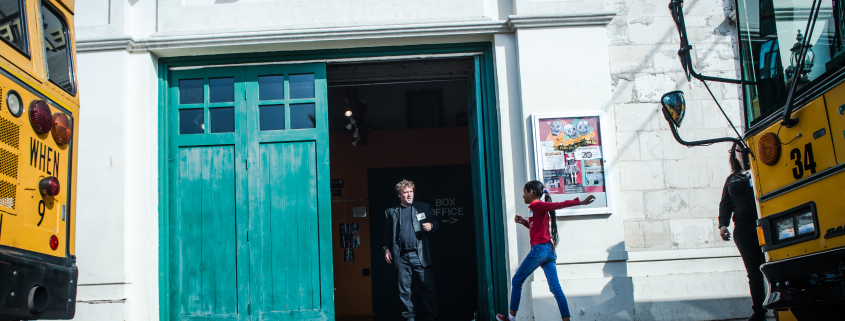24th STreet Theatre reflects reality and value of theatre in modern day

Production, community and education — these three things build the essence of 24th STreet Theatre’s mission to the local community.
Established in 1997 by executive director Jay McAdams and artistic director Debbie Devine, the 24th STreet Theatre, located a few blocks down Hoover from USC’s campus, focuses on quality storytelling, a helping hand and a platform for students and adults alike to learn more about themselves and the world through the performing arts.
24th STreet Theatre provides “After Cool,” free afterschool classes for local students from second grade to high school, as well as a number of readiness classes for high schoolers, teachers and adults covering topics on leadership, college and professional development training for teaching. The Theatre also offers social justice, social-emotional learning and unconscious bias lessons.
“Starting in 2020, when all the schools were closed, everybody was locked down; we created a whole new thing online with live people. It’s not just a recording that we send them,” McAdams said. “[It’s] a whole team of teaching artists, musicians [and a] stage manager are all there, and we’re talking to the kids real time.”
In addition, the Theatre’s Latinx programming, directed by associate artistic director Jesus Castaños-Chima, brings non-professional Spanish-speaking actors onto the stage through community-based projects in the program, Teatro del Pueblo. Most participants are relatives or parents of the students within the after school programs, Castaños-Chima said.
“To be able to provide that, to give them the tools to become a person, a better citizen. Because they’re not thinking about going to Hollywood and [making] movies, professional theatre, even though some of them do it, it’s not the intention. They just come here to entertain themselves to, as I said, enrich their lives in a different way, just come out from their routines,” Castaños-Chima said. “That’s something that I really enjoy and love to do.”
Through professional Spanish theatre, Castaños-Chima and the Theatre have toured various cities in Mexico.
According to educational programs manager Arie Levine, the value of theatre and the arts extends back to its basic form of physical storytelling.
“Art is entertainment, entertainment is art, and theatre is in the world of storytelling,” Levine said. “There’s so many ways to tell stories, but if you go back in time, it all comes down to a person and an audience, and theatre really distills that storytelling relationship to its most live, in-person form.”
Theatre aids in social-emotional learning of awareness and empathy, as understanding characters’ perspectives through acting can transfer into real-life skills when encountering situations of conflict or disagreement, Levine said. Especially due to the advancement of digital communication and the current pandemic, McAdams said that the face-to-face interaction and communication that theatre arts requires is necessary and valuable.
“At 24th STreet, we take the arts very seriously because we consider this essential, something crucial for the human being, for citizens to be more sensitive and [show] more concern [and be] more aware of what’s going on in our society,” Castaños-Chima said, “This is the way we can fight crime, we can fight many things — through [the performing] arts.”
But most importantly, through the performing arts, regardless of the form, Levine said, “kids become themselves.”
24th STreet Theatre productions reflect current social issues for family audiences that keep them aware of the world in kid-friendly presentations. Adding vivid relevance, but not without a hint of — what McAdams calls — magic, the productions have been called sophisticated enough to be adult theatre.
“Whatever we do matters to our society … and we stage it in a very positive way,” Castaños-Chima said.
The newest production, “Rapunzel Alone”, put on in association with The Wallis Annenberg Center for Performing Arts and written by Mike Kenny, is about Lettie, a young girl of multiracial heritage in London during World War II who is sent to the countryside to live with a stranger named Ms. Pearce. Inspired by the original fairy tale’s themes of isolation and connection, the production also explores racial issues.
“The play is mostly about the relationship between Lettie and Ms. Pearce, who are both isolated in different ways, and their relationship together living through a very strange time in their lives,” Levine said. “Just like [how] we took inspiration from the time that we’re in now with COVID, where so many people feel isolated and are going through a time that is unlike anything we’ve experienced in our lifetimes,”
Addressing social ills creatively for family audiences encourages the younger generation to be aware of them, while also sharing an enjoyable and educational experience with friends and family, McAdams said.
“It wasn’t very long before the neighborhood started to come in the doors, and I started to realize that [the Theatre] was a tool. Theatre was the most useful if I used it as a tool to help people,” McAdams said, “But even beyond that, offering programs to kids and offering help to community members when they need it, we do that in all sorts of ways. For me, that’s how it’s changed, as I now see theatre not as ‘the place, the thing’ but as the place, the thing that we can help people with.”
Correction: Jay McAdams and artistic director Debbie Devine co-founded the 24th STreet Theatre and oversee its operations together. This article was updated to note Devine’s role as co-founder.

